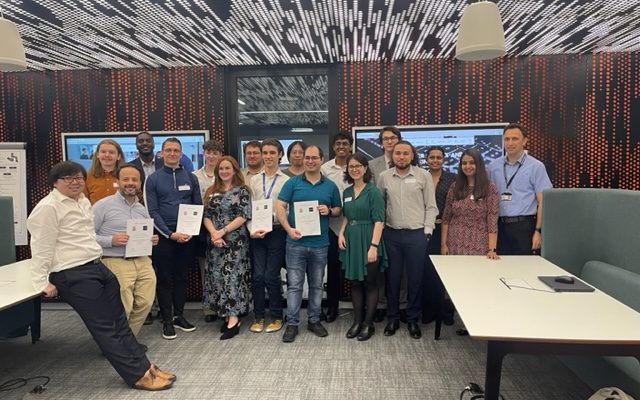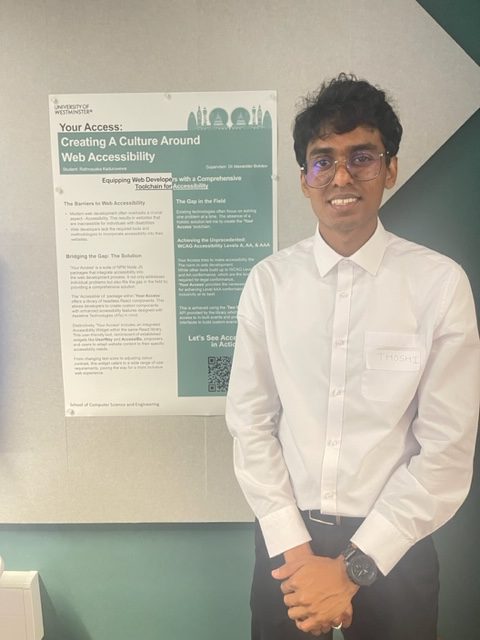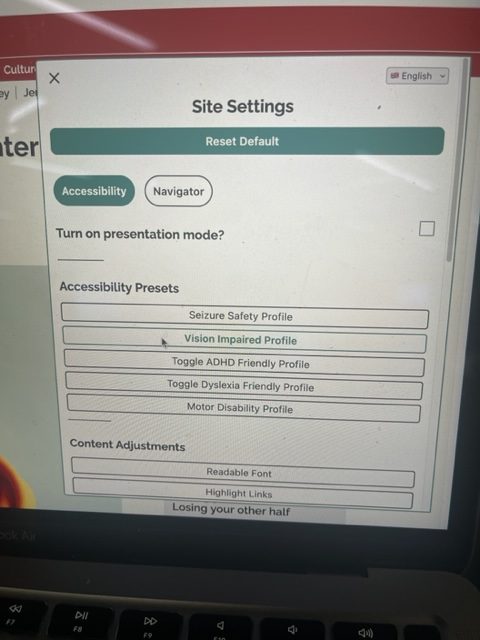The School of Computer Science and Engineering held a project showcase for their final-year students. For the second year in a row, the showcase was held in collaboration with Netcompany, an international consultancy, headquartered in Denmark, who offer end-to-end IT services from development through to maintenance and operations, for public and private companies across Europe. In addition to collaborating with the School for this event, Netcompany have also provided a live project as part of a module for second year students and offered a year-long industrial placement to a second-year student from the Computer Science BSc course.
During the event, ten students from across the School presented their final year projects to a panel of IT industry professionals from Netcompany. Each project tackled a different societal challenge and used the latest tools and technologies in Artificial Intelligence, Robotics, Cyber Security, Mobile and Web. The panel consisted of technical managers, senior consultants and developers who assessed and evaluated the student projects.
The event concluded with a celebration of ten student projects that were selected from over 250 final-year projects across the School. The student projects were nominated by their supervisors and shortlisted to ten by a panel of academics. The criteria for selection included originality, technical difficulty, implementation quality and social impact. Students from first and second year of the School’s programmes were invited to celebrate with their peers as well as be inspired by their work. All ten students were recognised and received a certificate and prize for their projects. The best projects were awarded in the following categories: 1st, 2nd,3rd and a Social Impact prize.
We spoke with the 4 prize winners to hear a bit more about their final-year projects, time at Westminster and their future plans.
Shannon Honan – Computer Science BSc
WON: 1st place for best project
A Cloud-Based Deep Learning Approach to the Classification of Breast Ultrasound Images.
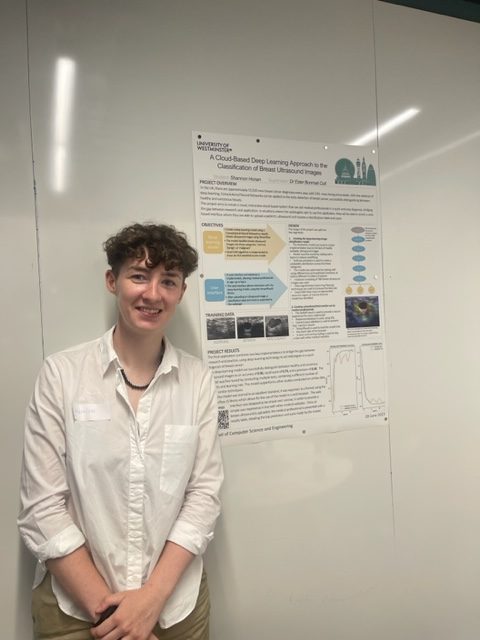
This project bridges the gap between research and application and creates a website for medical professionals to upload a breast ultrasound image. The model processes the image and gives a classification label; normal, benign or malignant with a score on the confidence of the classification decision. The application would be used as an additional diagnostic tool for radiologists, to help resolve the issues of human error and decrease the number of preventable cases with quick and early diagnosis of breast cancer.
Whilst studying at Westminster, Shannon attended a series of talks and workshops to help with creating her CV and presenting at interviews. Looking to the future, Shannon would like to pursue a career as a software developer.
Shannon’s project won 1st prize at the awards. Speaking about the event Shannon commented “Taking part in the competition and presenting my work to industry professionals was incredibly rewarding. It provided validation, feedback, and valuable insights. The experience allowed me to showcase my abilities, build credibility, and network – and I’m very happy with the outcome!”
Piotr Stanny – Software Engineering BSc
WON: 2nd place for best project
Quantfit, an Evidence-Based Mobile App for Self-Managing Fitness
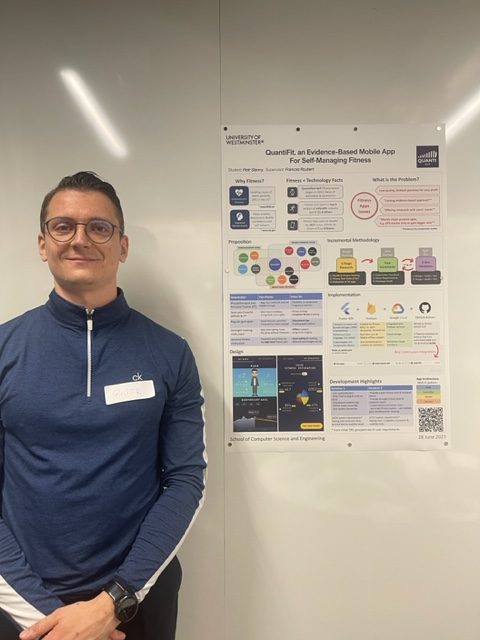
The Quantfit mobile app is the first of its kind to focus on long term fitness management and tracks various fitness activities such as cardio, cycling and gym routines in one place. The app allows users to create a profile to test their current fitness and track their progress long-term. Users are also able to access educational content to help them understand their fitness journey, track their progress whilst offline and adjust metric systems. Quantfit allows users to set personal goals and calculates the likelihood or confidence of the user achieving their goal, taking into consideration their activity and deadline.
Piotr created the App on Flutter, a cross platform technology, which allows developers to design Apps for both iOS and Android with a single code, saving time and resources for developers. Piotr attended a series of workshops hosted by the Creative Enterprise program at Westminster which helped him to start thinking about this project before his final year. Piotr has started a new graduate role as a developer working with Flutter technology. He plans to continue developing Quantfit whilst working within his new role.
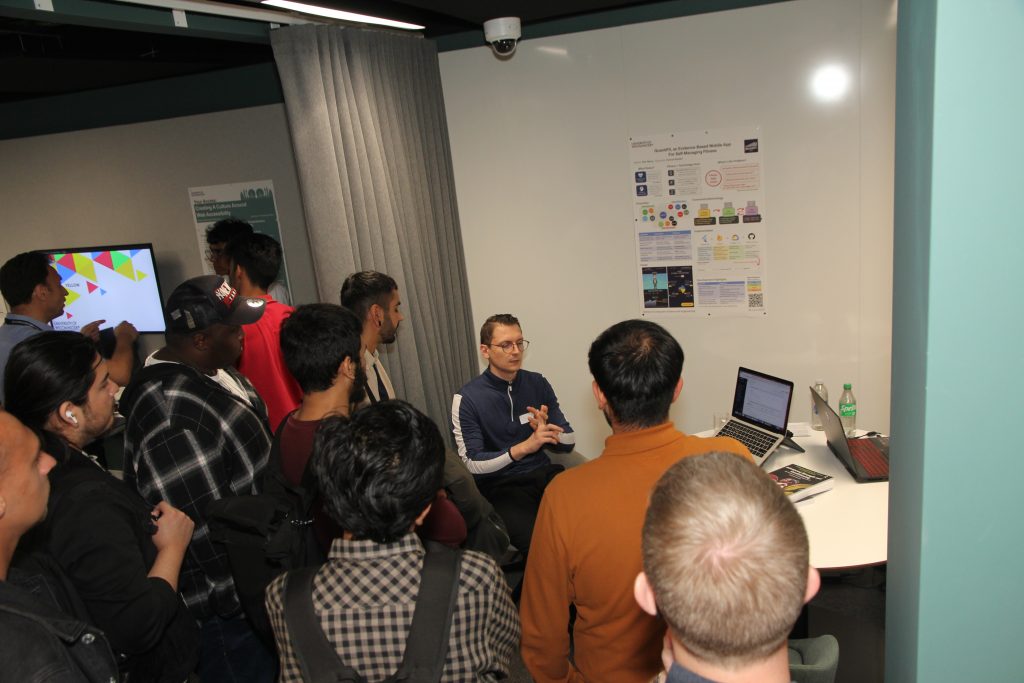
Maciej Sulecki – Data Science and Analytics BSc
WON: 3rd place for best project
TTR.guide Tools and Technologies Research guide
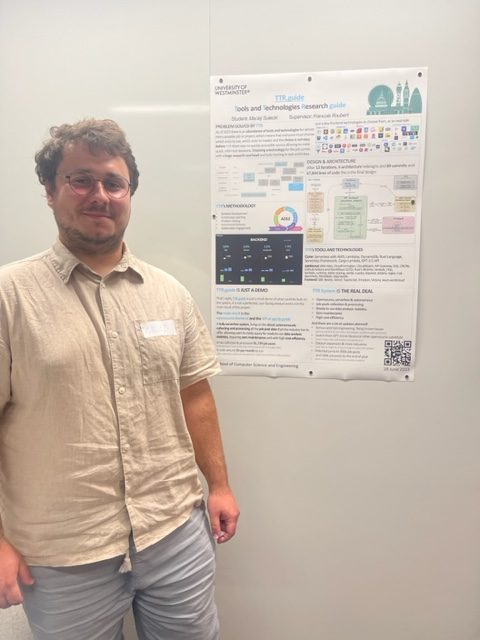
The project allows for researching tools and technologies within an industry, based on real world data coming from job posts. The project indexes job posts from reed.co.uk and extracts data about the technologies used in those jobs. The data is sent to the database to create statistics and analytics, to help provide insight on what is being used within various industries. In every profession, job and industry there are a wide range of tools and technologies that can be used. The TTR.guide is a place where data and analytics on various tools and technologies used within specific industries are easily viewed. The guide also shows data about roles with fields such as the median salary, popularity, remote/ office/ hybrid or full time/part time/ freelance. The TTR.guide can view technologies rising and lowering in popularity and view the industry stats for a specific time period.
Currently Maciej is working as a back-end developer and plans to continue working in this role after graduation.
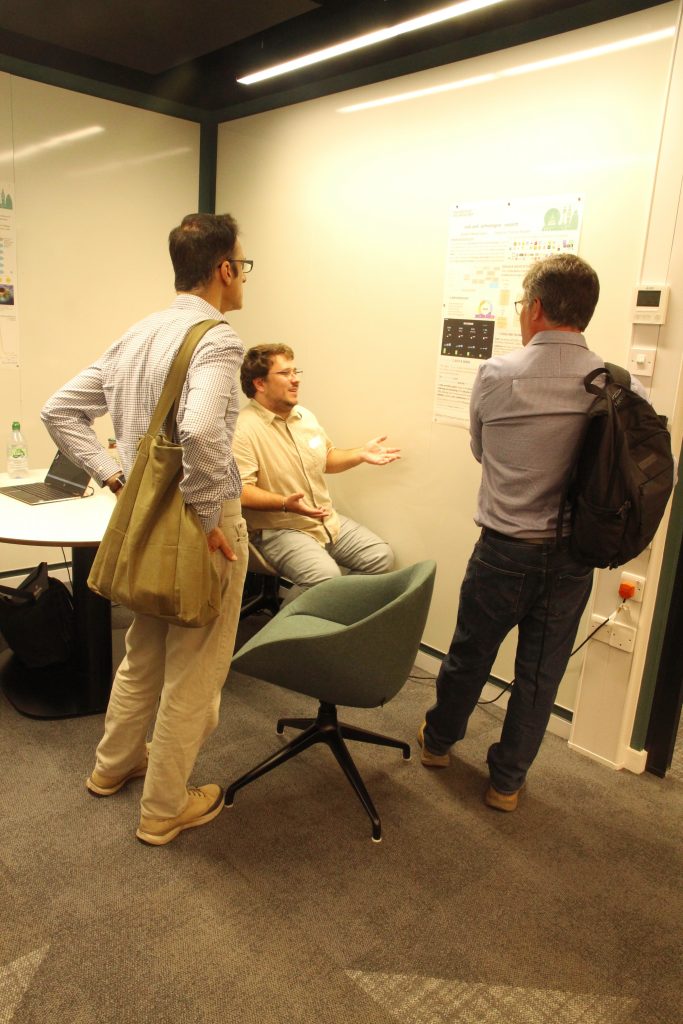
Rathnayaka Kaduruwewa – Software Engineering BEng
WON: Best project for Social Impact
Creating a culture around web accessibility
Rathnayaka created Your Access, a suite of NPM Node JS packages that integrate accessibility into the web development process. Developers are able to use and incorporate into their websites the ‘library’ or ‘recipe’ of custom components with enhanced accessibility features designed with Assistive Technologies (AT’s) in mind.
Your Access hopes to save web developers time and save companies money as accessibility is often seen as an additional time-consuming expense. The purpose of the project is to make integrating accessibility into web development as easy as possible for developers. Typing in a command, would provide developers with a boiler plate code that is ready to use.
The user-friendly tool allows end-users to adapt website content to their specific accessibility needs from adjusting text sizes and colour contrast to disabling auto play on websites. The tool caters for a broad range of accessibility needs such as visual impairments (screen readers), dyslexia (readable font), ADHD (focused screen), Motor disability (larger cursor), paving the way for a more inclusive web experience.
Reflecting on his studies and time at Westminster, Rathnayaka’s enjoyed the diverse community he was able to be a part of. Studying alongside students and staff from many different countries opened his mind to many things and he was able to learn to communicate, understand and be empathetic with others.
Bakara Ovietabore, a Technical Manager at Netcompany who participated in the event as a panellist, said: “The Netcompany Awards were a fantastic showcase of the talent at the University of Westminster. Students delivered demos of their projects with real value to society and showed an excellent domain knowledge in a variety of subjects like health, accessibility, and security. Technical skills on display included AI, Machine Learning, DevOps, and modern programming technologies. What impressed me on the day was the clear passion from students and the thought they put into the viability of their solutions in the commercial world.”
Huseyin Dagdeviren, Senior Lecturer and Director of Employability at the School of Computer Science and Engineering organised and hosted the event. Huseyin commented “It has been a great event. The atmosphere was fantastic with a lot of useful interactions among students and Netcompany professionals. The event provided students with the opportunity to demonstrate the result of a year’s hard work to professionals from industry and receive feedback. It also allowed the first and second-year students to learn from final-year students and to network with Netcompany’s employees. This type of event is very useful for students to reinforce and develop their skills. I thoroughly enjoyed the event. It was a great way to end the academic year and celebrate the hard work of students”.
About Westminster
As one of the most diverse universities in the UK, we are a global university with London energy, with more than 19,000 students from 169 countries. Find out more about our Computer Science and Engineering courses.
- MORE 2025: Showcasing the Future of Architecture and Cities - October 27, 2025
- Opportunities at Westminster: My journey as a Student Ambassador - October 3, 2025
- OPEN 2025 Celebrating Talented Students - July 23, 2025
